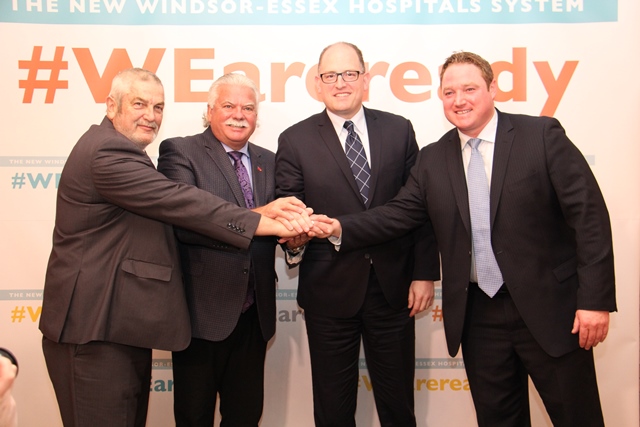By Allison Johnson
When you head down Highway 401 toward the Canada’s southern most region, there’s a buzz that becomes increasingly more apparent as you approach Windsor-Essex. It’s a growing number of people saying in unison, “We Are Ready”. It’s not just a hashtag used to promote the area’s vision for a redesigned, integrated, world-class hospital system, it’s an energy that is percolating in residents eager to turn this vision into a reality.
In 2012, Ontario’s then Finance Minister Dwight Duncan, created a taskforce to examine the need and appetite for a new regional acute care hospital that would replace the two current, outdated acute care hospitals. After six months of investigation and extensive community engagement, the taskforce recommended moving forward immediately with the planning.
Four years later, they not only have a bold and innovative vision to transform healthcare in the region, including a new state-of-the-art hospital, they also have the $200-million local share committed and started to be raised by way of a joint City and County levy to cover the cost of the build.
“I’ve been in this region since I was born. In nearly 50 years, there has not been a project that has united residents like this has,” says Windsor Regional Hospital President and CEO David Musyj, who Co-chairs the Steering Committee overseeing the project. “It has brought the city and county closer together, we have elected leaders of all political stripes supporting the project, our local MPPs have been extraordinary, our clinical leadership and medical students have made it clear about the need and there have been numerous community groups and associations including business and labour groups on board. Everyone recognizes this is a once-in-a-lifetime opportunity to improve this system for future generations.”
Windsor Regional Hospital is Ontario’s third largest community teaching hospital and eleventh largest hospital. The proposed vision includes replacing its two aging acute care campuses with a single-site, state-of-the-art hospital. Like the new hospitals that have recently opened in Toronto, Oakville and St. Catherines, this facility will have 80 per cent single- patient rooms to reduce the spread of infection, increase patient privacy and patient flow and modern technology to improve communication and the overall patient experience.
In addition, the plan includes a major overhaul of the way mental health is delivered in the region, with the creation of a Centre of Mental Health Excellence to provide a single point of entry for patients of all ages into the mental heath system. It includes an Urgent Care Centre, with the physical “wrap around” presence of primary care providers like the Windsor Family Health Team in the same facility, chronic pain management, dialysis and mental health services for patients in the city’s core. The plan provides patient’s greater access, connects them to community care, provides more coordinated information to patients for their decision making process and protects the patients. Bottom line the plan as proposed puts Patient’s First.
If approved, the province of Ontario will cover 90 per cent of the $2B investment. Residents in Windsor- Essex are already putting money aside to pay the remaining $200 million local share. The municipal levy passed overwhelmingly – by a unanimous vote at County Council, and a 9-1 vote at Windsor City Council earlier this year.
What has separated this project from others is the level of community engagement. There have been 50+ community meeting events, opportunities to provide feedback online and during radio phone in programs. In addition, members of the public were invited to provide feedback on criteria used to select the location for a new hospital and apply for a seat on the committee that made the ultimate decision. A volunteer committee made up of region’s residents along with the needed planning expertise ended up selecting the site for the new acute care hospital. Unprecedented.
Those involved in the project say this level of community participation in a project this size is both brave and unprecedented.
“In no community that I know of, anywhere in Canada, has there been such an extensive community engagement process,” says Lucy Brun, a partner at Agnew Peckham with 32 years experience in healthcare planning.
Brun says community engagement and collaboration of community leaders allowed this region to move easily through what is often the most challenging part of planning – paying for it.
The Steering Committee overseeing this system transformation has completed the first of a 5- stage planning process and submitted it to the community to the Ministry of Health and Long-Term Care and is currently waiting for approval to move onto the functional planning and design.
Expect big things once they get the go ahead to implement this system transformation. The residents in Windsor-Essex are ready to modernize the hospitals system for patients in the region. #WEareready.
Allison Johnson is Communications Manager, Windsor Regional Hospital.




